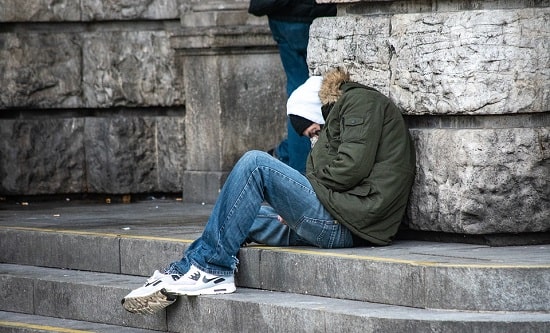
The 2007/08 ‘financial crash’ was a manifestation of the unresolvable crisis of global capitalism. This is a system that is defended and organised by the capitalist class and their lieutenants, necessarily through imposing costs on the working class. As such, when the banks were hit, it was the poor who took the beating, not the wealthy. Over the last decade they have, Phoenix-like, done very well out of the wreckage; their finances have not crashed, they have soared. The abject ruination of the bottom rung of society is evidenced by stagnating wages and increased mortality.
After 10 years of austerity and stagnant pay growth for workers, Angus Deaton, a noble prize-winning economist is carrying out a review into inequality in Britain, which he argues is on a path to becoming one of the most unequal countries on the planet and on par with living standard disparity in the US. Conditions of life for the working class in the most powerful country on the planet are appalling. Life expectancy there has fallen for three years in a row, for the first time in 100 years. Deaton stated, ‘There’s a real question about whether democratic capitalism is working, when it’s only working for part of the population.’
What crisis?
In Britain, the average worker is still £17 a week worse off than before the 2008 crisis; while those working in the finance sector have seen an average of £120 a week increase over the same period. Average chief executive pay at FTSE 100 firms has risen to 145 times that of the average worker. It was 47 times in 1998. This shows that not only has the age of austerity not put a dent in the wage packets of the CEOs, but that their wealth accumulation has actually accelerated through this period: inequality is growing at a rate of knots. It is not that the British economy is doing better. The pace of dividend growth has far outstripped that of the British economy as a whole, as well as wages paid to British workers. The rich are taking a bigger share of ‘national income’ – partly through cuts in the top rate of income tax. The richest 1% reaps 8% of national household income – this has almost tripled in the last four decades, since the re-emergence of the capitalist crisis in the 1970s. Simultaneously, earnings in the lowest-earning working households have barely risen since the mid-1990s (90% of British people saw their share of national household income decline or stay flat over the long term) – pushing 22% of the population into relative income poverty in 2017/18.
Income inequality in Britain had been relatively stable; this was largely because tax credits had offset worsening earnings inequality. The bedroom tax, Universal Credit and benefits cap (along with cuts in wages in real terms) have removed the safety net. In most years since the 2008 financial crisis, workers have taken a pay cut in real terms, after inflation. Added to this is the fact that while there is technically full employment, with record low unemployment (at 3.8%) and record high employment at (76.1%), this has been achieved via involuntary part-time work, which has increased inequality. Over 26% of all jobs are now part-time. Involuntary part-time employment is a growing long-term trend, with one in ten workers stuck in them. Between 2003 and 2019 the proportion of people trapped in part-time jobs who need full-time jobs jumped from 7% to 11%.
Poverty has led to increased mortality. The steady increase in life expectancy has stalled and ‘deaths of despair’ (suicide and drug and alcohol related deaths) have more than doubled among men since the early 1990s. These deaths have risen from about 30 to 61 men per 100,000 adults, with Blackpool and the North East being hotspots.
Austerity is paying dividends for the rich
Shell, BP, Vodafone, British American Tobacco, Imperial and BT who rob resources and impoverish entire nations around the world, are among the top dividend payers in this country. Share ownership is overwhelmingly concentrated among wealthier people and dividend income is taxed at a lower rate than regular income. In spite of uncertainty about the global economy and Brexit negotiations, dividends paid to shareholders jumped to a record high in the first three months of 2019, putting investors on track for £100bn in payouts this year – the highest amount in the country’s history. The aftermath of the global financial crisis for the rich has been rosy. Regular dividends have risen every year since 2009, with total dividends paid to shareholders between then and 2018 growing by 85%.
Imperialist plunder of some of the poorest people on the planet bolsters national income and destroys the environment. In the first quarter of 2019, FTSE 100, Anglo-Australian mining and oil giant BHP paid out £2.6bn as a special dividend. Royal Dutch Shell, another oil company, paid £2.9bn – the largest dividend payment in 2019 so far. A third oil company, BP, paid out £1bn. Shell, BHP and BP are three of just 90 companies responsible for nearly two-thirds of greenhouse gas emissions since the beginning of the industrial age. They have also caused huge environmental disasters such as the Bento Rodrigues dam collapse, the worst disaster in Brazil’s history. They are responsible for the climate crisis we face today. British American Tobacco (BAT), one of the biggest tobacco companies on the planet, also paid out £1bn in dividends. BAT has turned Malawi, one of the world’s most underdeveloped countries, into a tobacco plantation, and extracts super profits through the use of child labour. Eliminating child labour in Malawi and replacing it with adult labour paid at the minimum wage would increase production costs by $10m per year. This would eat into shareholder rewards and so cannot be allowed – the thievery must continue.
Inequality in Britain is mirrored and often magnified oversees. We must fight it on both fronts.
Mark Moncada




